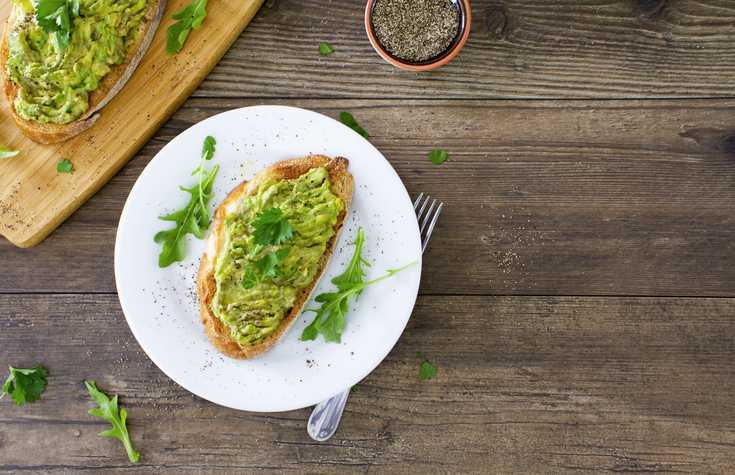- Fats consist of a mixture of saturated, polyunsaturated and monounsaturated fats. Fats should not be thought of as unhealthy. In fact, some unsaturated fats are essential in the diet.
- Healthy fats include those that contain mainly unsaturated fats, such as fish and seafood, nuts and seeds, extra virgin olive oil and avocado.
- Many foods high in saturated fats are linked with high levels of LDL cholesterol in the blood, a risk factor for heart disease.
- Foods high in saturated fats include many fast foods and takeaway, pastries, fried foods, cakes and biscuits, many snack foods (sweet and savoury), fatty meats, butter, coconut oil, palm oil and some solid spreads and cooking fats.
- Trans fats are unhealthy. Most come from oils processed to increase shelf life and give a crisp texture to foods. Fortunately, most major food companies in Australia have changed their processing methods so trans fats are no longer found in most soft spreads or frying fats used for some popular fast foods.
4 minute read
Fats provide flavour to many foods. There are different types of fats, and some are healthier than others. Unsaturated fats are an important part of a healthy diet. They can provide essential fatty acids we can’t make in the body. They also help with the absorption of fat-soluble vitamins.
All types of fats provide 37 kilojoule/gram. To help you stay healthy, it’s best to choose healthy fats, in small to moderate amounts.
Unsaturated fats are healthy fats
Unsaturated fats are an important part of a healthy diet. Swapping foods high in saturated fats with unsaturated fats may help reduce blood cholesterol levels, which may reduce the risk of heart disease.
There are two main classes of unsaturated fats:
- polyunsaturated fats
- monounsaturated fats.
Polyunsaturated fats
Two major families of polyunsaturated fats called omega-3s and omega-6s are essential in the diet as they can’t be made in the body.
Omega-3 fats play many important roles in the body, including helping protect against heart disease, stroke and various health problems relating to inflammation. They can be found in:
- fish and seafood
- walnuts
- canola oil
- soy products
- linseeds (also known as flaxseeds)
- omega-3 enriched eggs.
Omega-6 fats have been shown to decrease the risk of heart disease when consumed in place of saturated and trans fats. Sources of omega-6 include:
- sunflower seeds, linseeds and pepitas (pumpkin seeds)
- walnuts, Brazil nuts and pine nuts
- sunflower, soybean, corn, cottonseed and grapeseed oils.
Monounsaturated fats
Food sources of monounsaturated fats include:
- olive oil
- canola oil
- peanut, peanut butter and peanut oil
- almonds, cashews, hazelnuts, pistachio and pecan nuts
- avocados.
Replacing unhealthy saturated fats with monounsaturated fats may have a cholesterol lowering effect.
Here are some ways you can replace unhealthy fats with healthy fat options:
- Swap coconut oil or butter for extra virgin olive oil in cooking.
- Swap processed foods such as chips and cake for healthy snacks like nuts or seeds.
- Swap butter for avocado or hummus on your bread.
- Swap creamy salad dressing for a home-made olive oil-based dressing.
- Swap fried foods for foods cooked in olive or canola oil.
- Swap a processed meat or ham sandwich for chicken with avocado and cos lettuce, or enjoy a peanut butter sandwich.
- Swap sour cream for Greek yoghurt (good on steamed potatoes or sweet or savoury dishes).
The truth about saturated fat
In spite of some claims, research continues to show that a diet high in saturated fat is linked with high levels of cholesterol in the blood, a risk factor for heart disease.
Foods that contain saturated fats and may be problematic include:
- take-away foods such as chips, battered/crumbed and deep-fried foods, chicken nuggets and some burgers and pizzas
- fatty meats such as some cuts of beef, pork or lamb, most sausages, chicken skin and processed meats such as salami
- coconut oil, milk and cream, palm oil (used in many processed foods) and cooking margarine
- butter, cream, ice-cream
- pastries and pies
- most cakes and biscuits
- many snack foods, both sweet (such as chocolate) and savoury (such as crunchy extruded-type products).
Trans fats risky to health
Harmful trans fats form when vegetable oils are processed to make them solid, increasing their stability at room temperature and giving a longer shelf life and a crisp texture to baked or fried foods.
Foods high in trans fats increase levels of harmful LDL cholesterol in the blood and decrease beneficial HDL cholesterol. LDL cholesterol causes a build-up of plaque in your blood vessels, which can increase your risk of heart attack or stroke. On the contrary, HDL cholesterol can have a protective effect and help remove this plaque build-up.
This makes trans fats a hazard for heart health, and they have also been linked to other health problems. Many countries have banned foods that contain more than 2% of this type of trans fat.
Margarines previously contained trans fats until their harmful effects on heart health were discovered. Most soft margarine spreads in Australia now have little or no trans fats.
Trans fats still occur in take-away foods fried in ‘solid’ cooking oils, and are also found in some donuts, pies, pastries, cakes, biscuits and crunchy snack foods.
Check food labels for trans fats which may be described as ‘hydrogenated or partially hydrogenated vegetable oils’. Trans fats also occur naturally in small amounts in animal foods, including butter, beef, lamb and some fatty fish.
Plant sterols
Plant sterols are found in a range of plant foods. They are cholesterol-like components that help limit the amount of cholesterol your body absorbs from the food you eat. Including foods that contain plant sterols may help reduce your body’s cholesterol levels. Plant sterols are found in:
- fruits, vegetables and legumes
- nuts and seeds
- breads and cereals (some breakfast cereals are fortified with plant sterols)
- margarine with added plant sterols.
The best type of fat for a healthy heart
Unsaturated fats are the ‘healthy’ fats and it’s important to include these as part of a healthy diet. They help to keep your cholesterol levels in the healthy range and play important roles throughout the body.
The Heart Foundation stresses the importance of getting the balance right for the whole diet. With fats, this means reducing saturated and trans fats and replacing them with mono and polyunsaturated fats. This can lower your risk of having high cholesterol levels.
Enjoy healthy fats in small amounts each day by:
- cooking with healthy fats like extra virgin olive oil
- using unsaturated fats in place of saturated (for example, use avocado or table spread in place of butter in your sandwiches)
- eating fish and seafood at least twice a week
- snacking on nuts and adding them to your salads, muesli, roasted vegetables and stir fries
- using nut and seed butters, like peanut, almond, and tahini
- using avocado in salads, and on toast for breakfast.

Also try to avoid food high in saturated and trans fats. These fats can raise our blood cholesterol levels, one of the risk factors for heart disease.
To reduce the saturated fat in your diet, remember to:
- limit the amounts of discretionary foods such as takeaway items, biscuits, pastries, pies, cakes, chips and sweet or savoury packet snack foods
- avoid coconut and palm oils, butter and cream
- choose small portions of lean meats and trim any visible fat
- read the ingredient list on processed food labels and avoid partially or fully hydronated oils or fats
- check the nutrition information panel on spreads and select those that list trans fats as nil or < 0.1 g per 100g.
A diet low in saturated fats and trans fats, with moderate amounts of unsaturated fats, will help your health.

We recommend seeing an Accredited Practising Dietitian (APD) if you:
- have been diagnosed with high cholesterol, are at risk of heart disease or have another health condition that would benefit from eating more healthy fats
- would like to know how to include more healthy fats in your diet
- would like help to know how to read food labels
- have had a heart attack or other cardiac event.
APDs are university-trained nutrition experts. They can help you with personalised, easy-to-follow evidence-based advice.
APDs are Australia's most trusted dietetics professionals.
- Enjoy healthy fats in moderation each day.
- Swap unhealthy fats with healthy fat options when cooking and snacking.
- Avoid foods high in saturated and trans fats.
- Choose foods with healthy fats such as avocados, nuts and seeds, and cook with healthy oils such as olive, canola, sunflower, peanut or soybean.
- Make sure to include a range of fruits, vegetables and wholegrains as part of your diet.